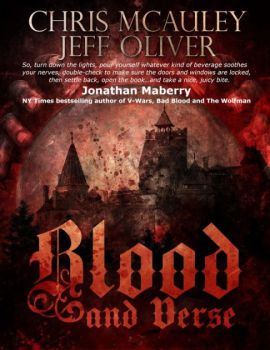 Blood and Verse by Chris McAuley and Jeff Oliver, illustrated By Dan Verkys
Blood and Verse by Chris McAuley and Jeff Oliver, illustrated By Dan Verkys
Cosby Media Productions (October 2023)
183 pages; $19.99; $5.99 e-book
Reviewed by Joshua Gage
Chris McAuley and Jeff Oliver are no strangers to horror writing, nor to the character of Dracula. Chris McAuley is a writer of prose novels, magazine short stories, video and tabletop games and audio dramas. Together with Bram Stoker’s Great-Grand nephew Dacre Stoker, he has created the StokerVerse franchise. Jeff Oliver is a writer of intense emotions, having started composing his dark poetry at just 11 years old. Together, they have written a sequel to Bram Stoker’s Dracula titled Blood and Verse.
The collection begins with the following Disclaimer: “In this collection we have explored all aspects of Dracula which have been in print or cinema over the course of the last 126 years.” This is emphasized by both Dr. Michael H. Likey in his Introduction, as well as in the Foreword by Jonathan Maberry. These two experts present the history of the Dracula story, its influences, and how McAuley and Oliver explore the story.
This book is divided into two sections, McAuley’s “Blood and Prose” and Oliver’s “Blood and Poetry.” While both sections inform each other, they are independent of each other, and make for an interesting conversation which the reader has the pleasure of observing.
McAuley’s section is much shorter, less than a third of the total book. The narrative sections read very much like a hidden history. There are accounts of Dracula attending a Devil’s School, as in the story “Dracula’s Devil,” or associating Dracula with Jack the Ripper, as in “The Blade in the Darkness.” McAuley is dedicated in his research and explains his findings in copious notes throughout the book for the reader. This provides a context for his stories, which can be helpful, but certainly aren’t necessary. McAuley also takes a few stabs at poetry, as in “The First Hunter,” but these poems ready very much like prose dissected into verse. The lines are full stop and the narrative rich:
Nimrod was a mighty warrior.
A Babylonian prince who was beyond comparison.
His Empire stretched across the known world and his word was
universal law.
After a decade of war, those in his nation began to know peace.
Until the undead horde swarmed the land.
From the Eastern lands of Nod, they spread fear and their dark disease.
This is typical of McAuley’s poetry, and fortunately, his prose is much stronger.
Oliver’s section, “Blood and Poetry,” is a departure from McAuley’s prose, but the poetry style and craft techniques are similar. Oliver approaches poetry from a narrative perspective, and is clearly writing poems that fit into the narrative mission and objective of this book. While there are occasional descriptions and images, for the most part, the poetry reads as prose separated into lines:
What else did this beast do?
Think Helsing, think!
I’m talking to myself again.
He’s in the other room drinking a woman’s blood…
What can I do?
Where can I run?
This thing is so powerful!
It’s stronger than a million musket balls blowing out your guts.
I feel attacked!
This thing that crawls down walls like a rabid alley cat.
I saw that happen with my own two eyes.
I know that the others will not believe me if I get out of here alive…
There is an attempt, perhaps, at a persona poem, but the narrative certainly takes over, which fits with the goal and mission of the book.
From the outset, Chris McAuley and Jeff Oliver make their goal for this book crystal clear:
It has been twenty years since the infamous Count Dracula was defeated by a small band of brave individuals led by the legendary Abraham Van Helsing. Now, as the world has moved on and forgotten the horrors that were faced, Van Helsing feels compelled to tell the true story of what happened during that hellish encounter. A follow-up to Bram Stoker’s classic novel, Jeff Oliver and Dr. Chris McAuley craft a book filled with prose and poem to describe the events contained within Dracula. It serves as both a sequel and prequel, with Van Helsing beginning to question the true nature of evil and the possibility of its return.
This is the purpose of this book, and McAuley and Oliver have clearly accomplished that. The narratives are there, and the stories, before and after, as well as the secrets and lives of characters overlooked or underdeveloped in the original. Fans of vampire narratives, especially Dracula-based narratives, will enjoy this book.



